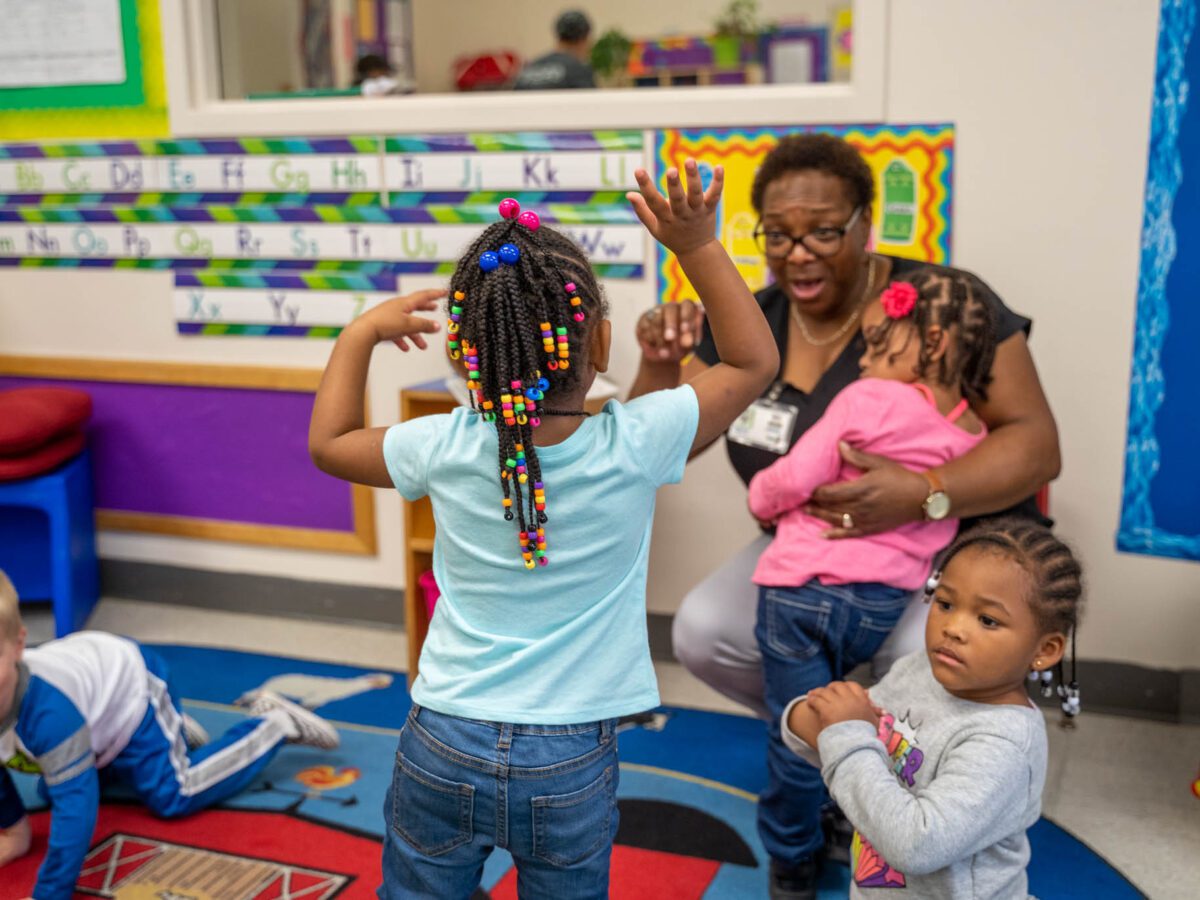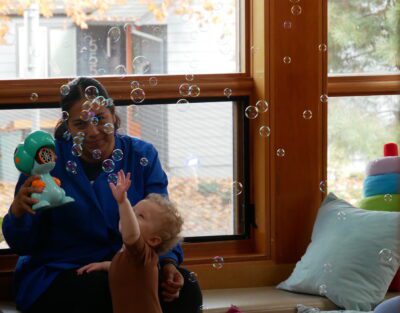
|
|
Editor’s note: This brief was originally published by the North Carolina Early Childhood Foundation on Aug. 19, 2024. It is republished here with permission from the authors.
North Carolina’s child care system is under-resourced, underfunded and in trouble.
Introduction
Child care took center stage during the pandemic and economic recovery. However, NC’s child care system was under strain long before the pandemic, with low wages making it difficult for providers to keep the staff needed to provide high-quality, reliable care and working parents struggling to bear the high cost of care.
Amidst a budget deadlock in June 2024, North Carolina passed $67.5 million in funding for child care. This is LESS THAN A QUARTER of the $300 million deemed necessary by early childhood education professionals to begin stabilizing the statewide child care crisis. It stands as a reminder that child care, and more broadly early childhood education, is a bipartisan issue. Building on this momentum, NCECF sees an opportunity to share information, advocacy action plans, and policy briefs that empower our community to strengthen and stabilize North Carolina’s early care and learning system.
77% of North Carolina voters say that access to child care is a serious problem.
86% say that improving the quality and affordability of child care is a good use of taxpayers’ money.
87% say that acting to fix the child care crisis should be a priority for North Carolina.
SOURCE: NC Chamber Foundation
PROBLEM: Unstable Child Care Systems for NC Families
Federal pandemic relief funds stabilized the system by distributing more than $834 million to child care facilities across North Carolina, with many providers using those funds to hire more staff and increase wages. Now, that funding has run out and providers across North Carolina, along with most states across the nation, are struggling to figure out how to stay open. In the current failed system there are:
- Not enough center- and home-based child care and pre-kindergarten providers to meet the demand for care.
- Care is currently provided at a cost that is both too high for most families to manage and yet too low for most providers to earn a living wage, which is $21.56 in North Carolina.
In North Carolina, the average daycare worker earns $11.69 per hour. This is less than the average fast food worker.
The average cost of a year of infant-toddler care is $9,480. This is more than the cost of one year of in-state college tuition.
There continue to be dramatic negative impacts on the state’s child care system. NC Secretary of DHHS Kody Kinsley recently reported that “300 child care centers in North Carolina closed [in 2023].” The severity of this issue is echoed in the comments of Ariel Ford, the outgoing Director of DHHS’s Division of Child Development and Early Education, “These closures are devastating to children, families, and communities who rely on child care to nurture their children’s healthy development and learning, allow parents to work and support their families, and keep local businesses running.”
These issues don’t just affect children, their parents, and care providers — it also has a substantial effect on the state’s economic health by shrinking the labor force, particularly women’s ability to enter and stay in the labor force.
A national survey of 3,600 mothers found that inadequate child care is causing 52% of them to consider leaving the workforce.
In 2023, the percentage of stay-at-home mothers rose to 25%, a significant increase from 15% in 2022.
Simply put, “the decision of families [especially single parent families] to participate in the workforce depends on access and availability of quality child care. child care provides an important infrastructure that supports working parents as well as the productivity of the economy.” In North Carolina, only 3.4 percent of families have a stay-at-home parent that cares for the children full-time. Efforts should be increased to ensure that a range of options of child care is available at cost levels that all families can afford, and is of a quality that fosters brain and social emotional development.
When we say that the child care system in North Carolina is unstable we mean:
- Few Options for Babies – Infant and toddler care is severely lacking in most communities and can be almost impossible to find in some rural communities. North Carolina only has enough infant and toddler care for 1 in 5 children.
- Long Waitlists – There aren’t enough child care and preschool seats available for all the families that need and want to place their children in stable, high-quality home and center-based care while they are at work or in an educational program. For example: Buncombe County, in which 69% of families with children under age 6 have all parents working, has lost approximately 11% of its child care slots since the pandemic, with availability continuing to decline.
- Low Wages for Providers and Educators – child care providers are experiencing a labor shortage because wages and benefits are too low to attract and keep staff. In 2021, North Carolina had about 2,000 fewer child care professionals than in 2019.
- Too Few Licensed Home-Based Care Providers – Family, friend, and neighbor child care (also known as informal child care) is a major part of the system. Statewide, only 24% of children under age 6 are enrolled in licensed centers or homes. The reality is that many families are using informal child care, a segment of the system in need of greater access to quality enhancement resources.
- Rural Areas Are Stretched – Rural communities face unique child care challenges because the lack of a concentrated population often means that families have to travel far to reach the nearest child care center. Thirty rural counties have 5 or fewer 4- and 5-star programs serving infants and toddlers.
Stabilizing this system is crucial, our economy will suffer without an influx of funding now. A new report by the U.S. Chamber of Commerce Foundation, in partnership with the NC Chamber Foundation and NC Child, estimates that problems with childcare are costing North Carolina $5.65 billion in lost economic activity.
SOLUTION: Systemic Challenges Require Systems Thinking
To apply systems thinking to child care and early learning, it is important that legislators understand how this issue affects many different stakeholders: young children, their parents, parents’ employers, and child care providers and their staff. They also have to think about the care options that work best for infants and toddlers, the types of care that meet the developmental needs and are most affordable for two and three years olds, and how to ensure that as many parents who want it can enroll their children in high quality pre-kindergarten programs. This requires seeing both the bigger picture and the interconnected parts. Ed NC has released a detailed article on the types of systemic solutions that are needed to solve this systemic problem.
The components of a high-quality, stable birth to five early care and learning system were clearly detailed in the Build Back Better Act. This provides state legislators with a blueprint for state-level policy guidance at their fingertips.
Regarding the type of thinking and action needed to quicken the pace of change, the figure to the right shows the six conditions that hold systemic problems in place and associated systems change tools can be helpful to those trying to stabilize North Carolina’s early care and learning system.

CHANGE AGENTS: CandL Coalition Fostering Systemic Change
During the height of the pandemic when the fragility of the nation’s and North Carolina’s child care system was highlighted, stakeholders were spurred into initiating the process of reimagining a statewide “publicly funded system in NC, where early childhood education (ECE) is a public good and is equitable, culturally responsive, and relevant to parents, teachers, and providers.”
North Carolina’s Care and Learning (CandL) Coalition is a key player in creating statewide systemic change by visioning and advocating for a system that places quality, affordable child care within reach for all North Carolina’s families, whatever their income or background.
CandL is a broad tent coalition of parents, providers, and statewide nonprofit and advocacy organizations who have come together because they realize that true transformation requires simultaneously working at all three levels of the system.

CandL stakeholders have placed parents and providers at the center of change because they recognize that systemic change necessitates transforming the power relationships among the people who make up the system.
CandL is empowering parents and providers to tell their stories because they recognize that changing the narrative, how we think and talk about the problem, is a foundational driver of solving systemic problems.
For example, parents reported a strong desire for home-based providers to be strengthened by reimbursing them at the same rate as center-based providers because they trust home-based providers most with the care of their youngest infants.
Utilizing this network of professionals and parents, legislators can chart a path to stability in our state’s child care system. It’s through strong policy, relationships, and implementation of model policies that we can best support our state’s families to allow our children to thrive.
ACTION: Taking a Stand for Early Care and Education
While this brief sets the stage of our state’s child care crisis, there is so much more to understand before we can find a clear path forward. Join us for “Taking a Stand for Early Care and Education: North Carolina’s Fight for Access, Equity and Fairness” a ten-part series, exploring a selected set of complex challenges plaguing North Carolina’s child care and early education system.
Each month, we’ll detail the interconnected threads that contribute to the persistence of the child care and early learning crisis. Through a detailed examination of data, expert insights, and advocacy perspectives, we will highlight systemic challenges and present actionable policy solutions to drive the transformation needed for a stable and equitable system. Join us as we delve into critical topics laying the groundwork for a robust dialogue on achieving universal pre-K, enhancing economic health through child care availability, and much more.






